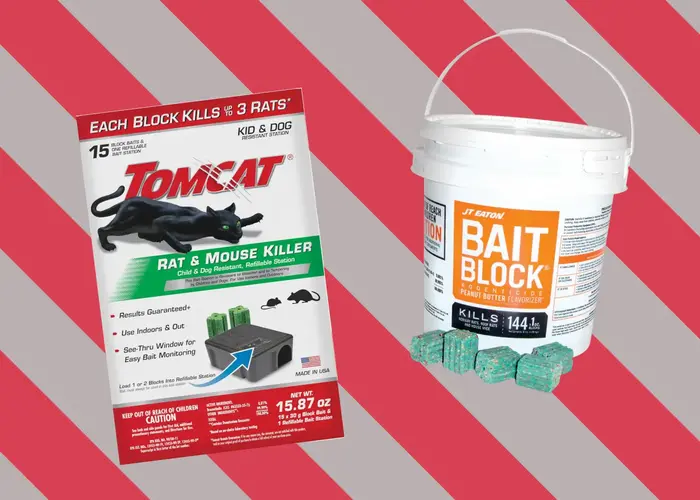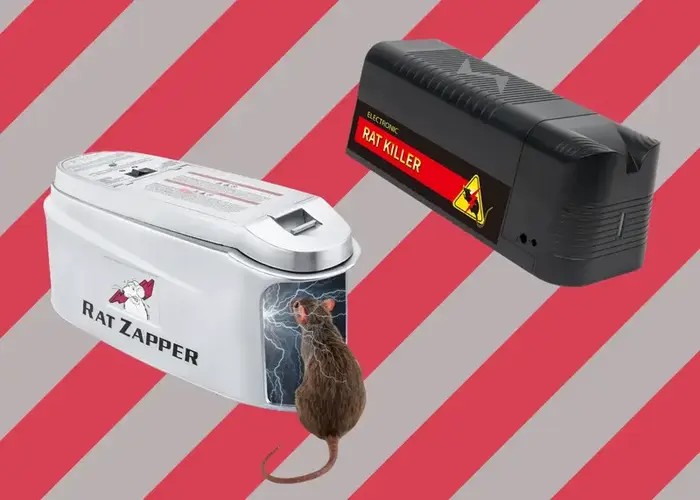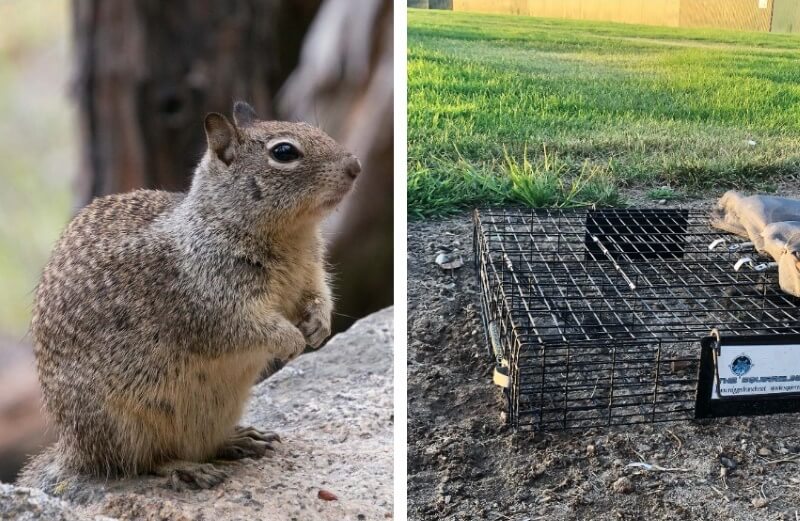

Chipmunks have always been wild animals but in more recent years people have started keeping them as pets at times. While they can eat a variety of things, there are certain nutritional needs for these small rodents, just as there are for any other type of animal out there. Chipmunks are beautiful creatures so if you’re helping to feed one or perhaps considering a pet, it’s important to know what’s best for their needs.
That being said, chipmunks are similar to animals like mice that will eat just about anything they can find when they are hungry. They do tend to eat quite a bit considering their small sizes. Don’t assume that just because they are small, they eat small.
In this guide, we will share with you more insight as to what do chipmunks eat. We will talk about their normal eating habits and what you can feed them to sustain them if you see one in need or take on a pet chipmunk as well.
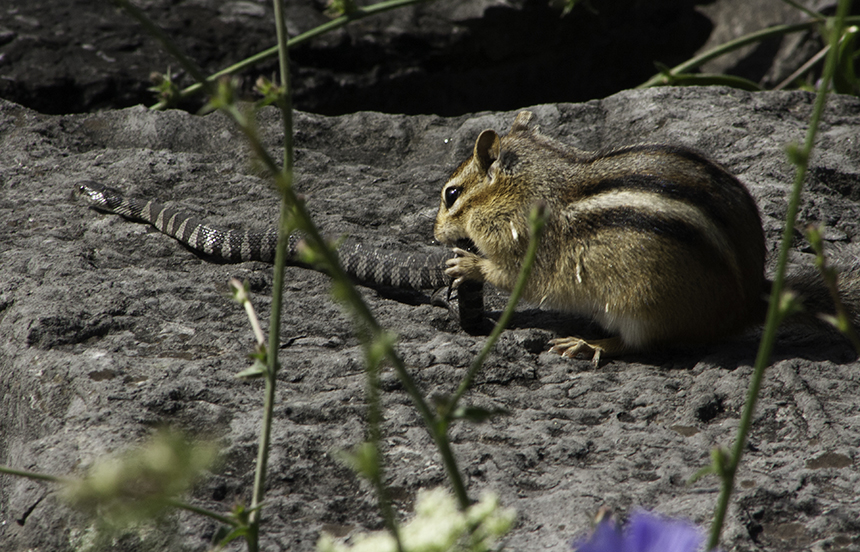
With animals like the chipmunk, we often assume that they survive on things like seeds and plants. They are commonly misidentified as being herbivores by people that don’t know any better. While you might not see them openly feasting on meat regularly, these small animals are actually omnivores.
As far as meat goes, they aren’t going to chase down a fox and eat that. However, they do sometimes eat carrion. They are more likely going to eat things like insects, frogs, eggs, or maybe small birds as well. At times, they even eat small snakes or lizards for their meat source.
Chipmunks do enjoy plants and sweet things so when you see them with stuffed cheeks, they are probably carrying things like nuts, seeds, and berries in their cheeks. They do create stores for the winter and always like to have food available for their snacking pleasures.
Let’s break it down a bit more below.
Chipmunks need both meat and non-meat sources for their best health. They rely on a variety of nutrients to survive. Chipmunks in the wild have a broad diet that is based on the things they are able to find or easily hunt where they are. However, chipmunks in the wild are more likely to be able to get the nutrients they need as well.
Another thing about chipmunks in the wild is that they are going to eat whatever they can find. Chipmunks will typically eat multiple times a day. In between feeding up to six times per day, they also spend a lot of time gathering and storing food for the winter. By wintertime, they might store up more than 8 pounds of seeds alone.
In the wild, a chipmunk will eat things like plants, seeds, fruits, roots, tree bark, nuts, and similar foods for their plant needs. In addition, they will need meat, which could include frogs, birds, insects, or bird eggs.
Chipmunks are mammals. As mammals, they will eat milk from their mother at birth. The mother will hunt for food and eat it for herself and then feed the baby her milk until they are old enough to start finding their own foods. Most chipmunks rely on the milk from their mothers for about two months.
Once they start to grow and move comfortably, they can start finding food. They are also born with their eyes closed so they will have to wait until their eyes open to start foraging for food.
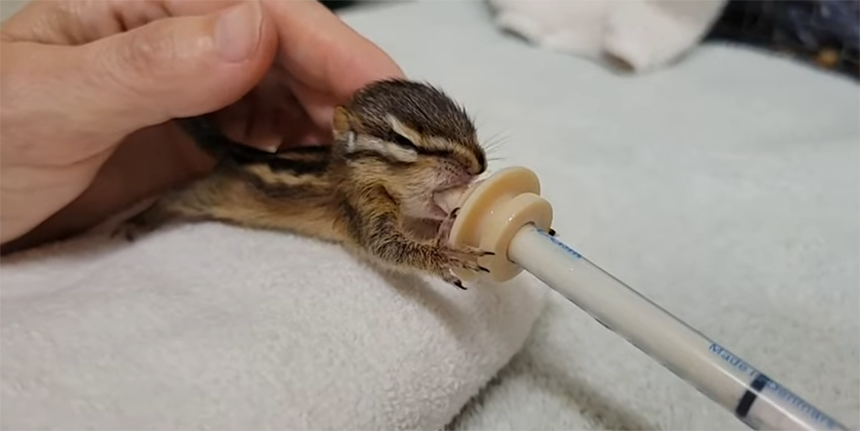
If you found a baby chipmunk that you are trying to feed, you could use a puppy milk replacement if milk is still needed. Some other options to try can be soft foods, particularly if they are a month old or more. In this case, start with soft items like berries or apples. You can even feed them softened rodent pellets if you need something for them.
As they grow, try adding seeds and nuts like this wildlife food mixture.
There are more than 25 different species of chipmunks. Most of them are very similar but they do have some differences. The Hopi chipmunk is found in areas in the Southwest United States, specifically in states like Arizona, Utah, and Colorado.
This particular breed is actually primarily herbivorous and prefers grains over any other type of food. They will eat a few nuts and fruits but primarily feast on things like seeds of different varieties. They like shrubs especially. These are some of the most common plants and seeds that they eat.
The majority of chipmunks are omnivores but that is where this species is different from most of the others. It’s important to know these details, particularly if you decide to try to raise one.

Chipmunks really do like a variety of different plants, fruits, and vegetables. If you have a garden that you can’t seem to keep chipmunks out of, it’s because you have tasty things in there. You could try one of the repellents for groundhogs to help keep chipmunks away. They are fairly effective at this concept.
If that doesn’t work or you’re still finding them too often, consider using chipmunk traps and then relocating any chipmunks you do happen to capture using these traps. You can use the foods listed here or try out some of the baits for chipmunks to pair with your traps. These are the garden vegetables that most chipmunks are attracted to or enjoy.
They do also like to eat things that grow on trees and not just these items that grow in the garden. Chipmunks love nuts and the implication that they eat acorns is really quite true.
Did we mention that even your flower garden might be appealing to chipmunks? They do like to eat plants and flowers too. Tulips are one of their favorites and they have been known to dig up bulbs to feat on. In addition, they like things like shrubs, seedlings, shoots, plant leaves of any kind, grass, and thistles.
You will find that chipmunks are not picky when it comes to plants. They tend to like leafy and flowery things. That being said, there are certain plants that they are not huge fans of. Some gardeners have discovered these plants and flowers and added them to their displays to act as a chipmunk repellent.
We’re not sure what it is about these plants and flowers that repel chipmunks but the effectiveness remains, making them a good option. Or, you can avoid them if you’re trying to attract chipmunks.
These plants include marigolds, daffodils, lavender, allium, hyacinth, camas, the glory of the snow, summer snowflakes, sage, and peppermint. Some people say it’s the bitter flavors that make these detestable to chipmunks. Others say it is their scents. But it’s hard to know just what the detail is that works in this regard.
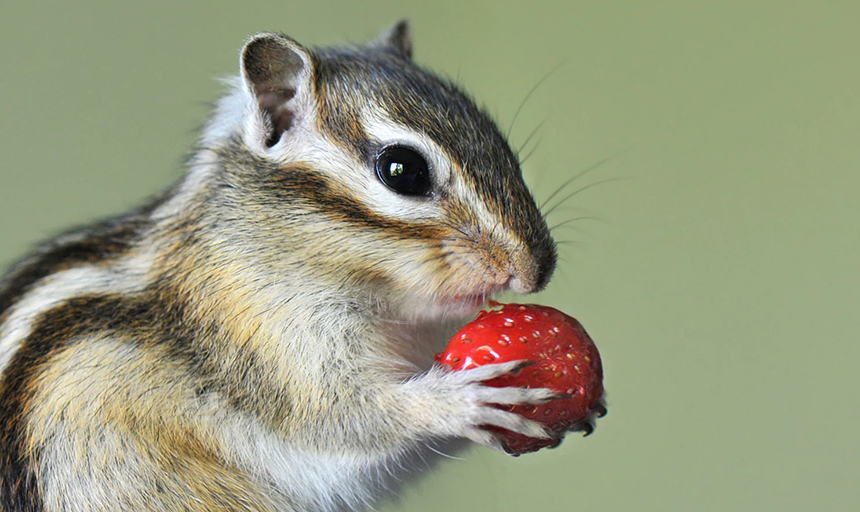
Chipmunks really like fruit and it might just be a quick way to their hearts if that’s what you’re looking for. If you want to feed your pet or perhaps appeal to a local chipmunk, try a fruit. They love sweet things and soft fruits are best. Fruits that tend to be juicy will definitely be winners.
Here are some of their favorite fruits. These are also very good for chipmunks and the nutrition that they need.
If you have other fruits on hand, you might be able to use those but these are certainly most of the favorites for chipmunks. Notice that the majority of these are known to be juicy and soft. It makes the fruit easy for the chipmunk to eat and the juice adds moisture for their enjoyment. These are also sweet fruits for the most part.
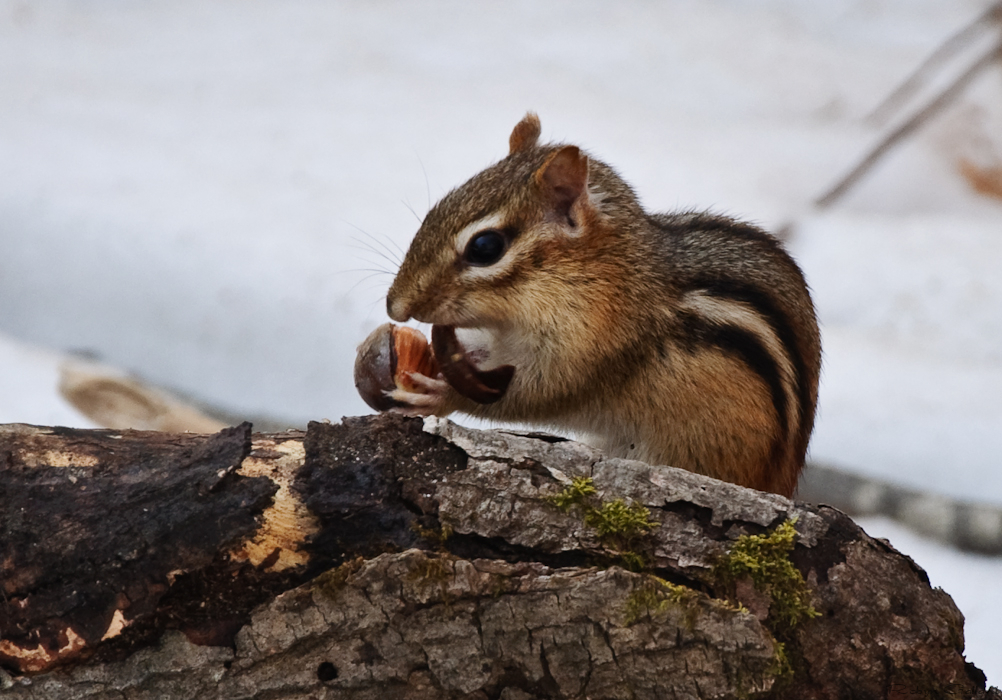
Throughout the spring, summer, and fall months, chipmunks spend a lot of time storing food. They tend to stock up on things that store easily and will not rot or go bad in the winter months. Of course, freezing temperatures will help to preserve things like fruits and vegetables but those are less likely to be stored away for hibernation.
The wintertime is when chipmunks will feast primarily on seeds, nuts, and grains. These are all dry foods that are easy to stockpile and will have important nutrients and protein for the chipmunk in their hibernation periods.
As far as nuts go, chipmunks like acorns, walnuts, pine nuts, and chestnuts are the best. They will have a variety of these. They will also be sure to mix in mountains of seeds and oats into their stockpiles. In non-hibernation months, chipmunks are known to eat quite a bit, up to six meals per day.
These meals have a variety of foods in them but their winter needs are not quite the same. They are mostly sleeping and staying in one place so far, less energy is needed from their diet. They do still need protein and sustenance to provide nutrients and minerals for their bodies.
Some of the reasons that they eat so much outside of hibernation are to store up fat on their bodies to last them through the winter. This allows them to survive on nuts and seeds while they are hibernating. They typically stock up on 8-10 pounds of food to last them through the winter months.
When it comes to summertime, chipmunks will eat anything they want. They will eat anything that they find to sustain them. We’ve identified all of their favorite foods and these are the types of things you will find them eating throughout the summer.
If you have a garden, chipmunks will be delighted with your crops and harvest. Don’t worry, they likely won’t eat it all but they might take bites out of several things.
They eat food from every category we have shared here and also tend to eat meat quite a bit in the summer too. This will include things like eggs, pet food, carrion, worms, insects, and more. They will also eat grains that they can find and love things like wheat, oats, barley, and millet.
Throughout the summer, a chipmunk needs a balanced diet and will typically eat from all of the food groups every day to help keep their needs met and help build up body fat to prepare them for the winter months.
Some of the things we haven’t mentioned that a chipmunk might eat include mealworms, salamanders, mushrooms, and similar items.
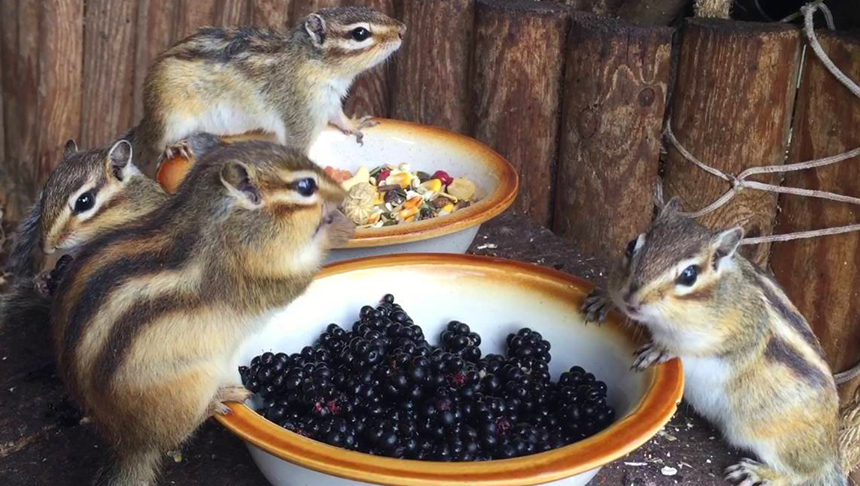
When you’re feeding your pet chipmunk, be sure to give them a variety of foods and stick to the things we have shared here. These corn-on-the-cob snacks are great to have on hand for your chipmunk to munch on.
If you have a pet chipmunk, you want to be very careful to feed them a balanced diet with a variety of foods that they enjoy. Make sure they are getting the proper nutrition that includes carbohydrates, meats, protein, and more. As a pet, you can stick to low-fat foods as they will likely not hibernate but can be fed all year with a balanced diet like this.
Include things like nuts, grains, fruits, vegetables, plants, and meat. Just be sure you understand your species of a chipmunk and know whether it is an herbivore species as they won’t need meat. Some chipmunk owners even use small amounts of pet food or dog biscuits to contribute to nutritional needs.
You can purchase rodent pellets that are used for animals like rabbits, gerbils, and hamsters. These are a great way to provide nutrition too.
Remember that chipmunks eat quite a bit of food so you will want to give them several small meals a day or keep food available for them. Provide them with a variety of fresh foods and dried foods to munch on. Cut foods up into chunks or small pieces to make them easier to eat and digest.
And when you’re planning meals for your pet chipmunk, don’t follow tips from Alvin and the Chipmunks. While your chipmunk might be willing to eat like this, it doesn’t mean they should!
Avoid things like garlic, cinnamon, peppermint, cakes, biscuits, candy, sweets, chili pepper, spicy foods, onions, and foods similar to these. Some of them might even be toxic and your chipmunk will likely refuse to eat a few of them.
Chipmunks in the wild can typically maintain their own health. They know their physical and eating needs and can better stay on top of them. However, your pet chipmunk relies on you to keep them healthy. Even wild chipmunks can suffer from some common ailments as well.
There are certain health problems that are common that you should be aware of. These are most common in pet chipmunks and come from how you feed or care for them.
What do chipmunks eat? They can eat a variety of foods but a balanced diet is crucial to fulfilling their nutritional needs. Understanding the foods that are bad for them is important, particularly if you plan to try to raise a pet chipmunk. In most cases, chipmunks can survive on a variety of foods but they also require specific nutrition to survive.
Most chipmunks are omnivores and need meats as well as other foods but there are chipmunks that don’t eat meat. Before you feed a chipmunk, take time to do a bit of research and ensure you’re feeding them foods that won’t harm them or cause them health issues.
Most chipmunks are not picky but they may have favorite foods. Fruits, vegetables, seeds, and nuts are almost always winning choices.
